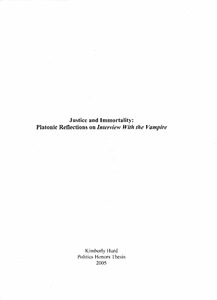| dc.rights.license | In Copyright | en_US |
| dc.creator | Hale, Kimberly Hurd | |
| dc.date.accessioned | 2023-10-20T18:01:38Z | |
| dc.date.available | 2023-10-20T18:01:38Z | |
| dc.date.created | 2005 | |
| dc.identifier | WLURG038_Hale_thesis_2005 | |
| dc.identifier.uri | https://dspace.wlu.edu/handle/11021/36535 | |
| dc.description.abstract | The relationship between human conceptions of justice and morality, encompassing both their similarities and differences, lies at the foundation of political philosophy and political society. The horizon of death constitutes an ever-present factor in our search for an understanding of both justice and morality. This understanding commonly manifests itself in the development of religious and secular law. Fear of
bodily death entices humans to form societies and legal systems to protect our bodily lives and punish any who threaten it. Belief in the immortality of the soul commonly hinges on a belief in absolute or divine justice, prompting human beings to adhere to a moral code, whether religious or philosophical. Morality and justice meet in the belief that our actions in this life will be rewarded or punished accordingly in the afterlife. The horizon of death assures us that even if we escape justice on earth, our eternal life will be characterized by eternal damnation. Divine justice is inescapable and inevitable, or so it seems. My study examines the necessity of certain justice in preserving morality. I wonder: Is there a morality which exists objectively outside of our societal and individual desires? Or are we, rather, merely trying to avoid punishment. Does virtue exist for virtue's sake, and if so, why? What does this mean? This study seeks to examine the relationship between morality, justice, and law. Let me reduce the foregoing to a question: Can any of these concepts exist without the horizon of death and the afterlife? Interview With the Vampire suggests that they cannot. Once immortality is possible, the vampires lose their need (and to a large extent their desire) for an abstract, enduring concept of either justice or morality. The measure of justice is determined by whoever is strongest, not whoever is most just. Morality is reduced to personal inclinations, or eradicated completely. Plato presents a different picture of human morality, though death is also a crucial factor in his argument. The tension between body and soul that defines Plato's conception of a human being is only resolved after death. Unlike Interview, Plato argues that morality and justice are real forces outside of human control. The source of moral authority and absolute justice is not the divine, however -- Plato believed it to be more objective than that. Cosmic justice is presented as the reward of the soul for preserving its moral integrity while trapped in a bodily life. The struggle
between the soul and the body is central to Plato's understanding of death. Socrates is fearless when facing execution because of his hope for a better afterlife. The vampires in Interview no longer experience this struggle. Its absence leads to despair and nihilism. [From introductory section] | en_US |
| dc.format.extent | 43 pages | en_US |
| dc.language.iso | en_US | en_US |
| dc.rights | This material is made available for use in research, teaching, and private study, pursuant to U.S. Copyright law. The user assumes full responsibility for any use of the materials, including but not limited to, infringement of copyright and publication rights of reproduced materials. Any materials used should be fully credited with the source. | en_US |
| dc.rights.uri | http://rightsstatements.org/vocab/InC/1.0/ | en_US |
| dc.subject.other | Washington and Lee University -- Honors in Politics | en_US |
| dc.title | Justice and Immortality: Platonic Reflections on Interview With the Vampire | en_US |
| dc.type | Text | en_US |
| dcterms.isPartOf | WLURG038 - Student Papers | en_US |
| dc.rights.holder | Hale, Kimberly Hurd | en_US |
| dc.subject.fast | Rice, Anne, 1941-2021 | en_US |
| dc.subject.fast | Political science -- Philosophy | en_US |
| dc.subject.fast | Ethics | en_US |
| dc.subject.fast | Immortality (Philosophy) | en_US |
